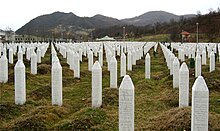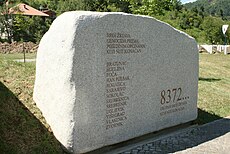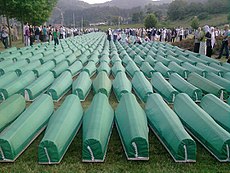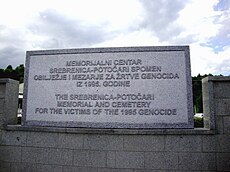
Back مذبحة سربرنيتسا Arabic Srebrenitsa qətliamı Azerbaijani سربرنیتسا سویقیریمی AZB Сребреницалағы геноцид Bashkir Разня ў Срэбраніцы Byelorussian Клане в Сребреница Bulgarian स्रेब्रेनिका नरसंहार Bihari Genocid u Srebrenici BS Matança de Srebrenica Catalan کوشتاری سربرێنیتسا CKB
This article contains one or more duplicated citations. The reason given is: DuplicateReferences detected: (December 2024)
|
| Srebrenica massacre Srebrenica genocide | |
|---|---|
| Part of the Bosnian War and the Bosnian genocide | |
 Some of the gravestones for the nearly 7,000 identified victims buried at the Srebrenica-Potočari Memorial and Cemetery for the Victims of the 1995 genocide.[1] | |
| Native name | Genocid u Srebrenici / Геноцид у Сребреници |
| Location | Srebrenica, Bosnia and Herzegovina |
| Coordinates | 44°06′N 19°18′E / 44.100°N 19.300°E |
| Date | 11 July 1995 – 31 July 1995 |
| Target | Bosniak men and boys |
Attack type | Genocide, mass murder, ethnic cleansing, genocidal rape, androcide |
| Deaths | 8,372[2] |
| Perpetrators | |
| Motive | Anti-Bosniak sentiment, Serbian irredentism, Islamophobia, Serbianisation |
The Srebrenica massacre,[a] also known as the Srebrenica genocide,[b][8] was the July 1995 genocidal killing[9] of more than 8,000[10] Bosniak Muslim men and boys in and around the town of Srebrenica during the Bosnian War.[11] It was mainly perpetrated by units of the Bosnian Serb Army of Republika Srpska under Ratko Mladić, though the Serb paramilitary unit Scorpions also participated.[6][12] The massacre was the first legally recognised genocide in Europe since the end of World War II.[13]
Before the massacre, the United Nations (UN) had declared the besieged enclave of Srebrenica a "safe area" under its protection. A UN Protection Force contingent of 370[14] lightly armed Dutch soldiers failed to deter the town's capture and subsequent massacre.[15][16][17][18] A list of people missing or killed during the massacre contains 8,372 names.[2] As of July 2012[update], 6,838 genocide victims had been identified through DNA analysis of body parts recovered from mass graves;[19] as of July 2021[update], 6,671 bodies had been buried at the Memorial Centre of Potočari, while another 236 had been buried elsewhere.[20] Some Serbs have claimed the massacre was retaliation for civilian casualties inflicted on Bosnian Serbs by Bosniak soldiers from Srebrenica under the command of Naser Orić.[21][22] These 'revenge' claims have been rejected and condemned by the International Criminal Tribunal for the former Yugoslavia (ICTY) and the UN.
In 2004, in a unanimous ruling on the case of Prosecutor v. Krstić, the Appeals Chamber of the ICTY ruled the massacre of the enclave's male inhabitants constituted genocide, a crime under international law.[23] The ruling was also upheld by the International Court of Justice in 2007.[24] The forcible transfer and abuse of between 25,000 and 30,000 Bosniak Muslim women, children and elderly, when accompanied by the massacre of the men, was found to constitute genocide.[25][26] In 2002, the government of the Netherlands resigned, citing its inability to prevent the massacre. In 2013, 2014 and 2019, the Dutch state was found liable by its supreme court and the Hague district court, of failing to prevent more than 300 deaths.[27][28][29][30] In 2013, Serbian president Tomislav Nikolić apologised for "the crime" of Srebrenica but refused to call it genocide.[31]
In 2005, then UN Secretary-General Kofi Annan described the massacre as "a terrible crime – the worst on European soil since the Second World War",[32] and in May 2024, the UN designated July 11 as the annual International Day of Reflection and Commemoration of the 1995 Genocide in Srebrenica.[33][34]
- ^ "At least 80 more Mass Graves with Remains of Srebrenica Genocide Victims". Sarajevo Times. 4 July 2023.
- ^ a b "Victims of the Srebrenica Massacre". The Polynational War Memorial. Retrieved 2 February 2022.
- ^ UN Press Release SG/SM/9993UN, 11/07/2005 "Secretary-General Kofi Annan's message to the ceremony marking the tenth anniversary of the Srebrenica massacre in Potocari-Srebrenica". Retrieved 9 August 2010.
- ^ "Tribunal Update: Briefly Noted". Institute for War & Peace Reporting. 18 March 2005. TU No 398. Retrieved 4 May 2017.
- ^ Sunter, Daniel (5 August 2005). "Serbia: Mladic "Recruited" Infamous Scorpions". Institute for War and Peace Reporting. Retrieved 30 April 2017.
- ^ a b Williams, Daniel. "Srebrenica Video Vindicates Long Pursuit by Serb Activist". The Washington Post. Retrieved 26 May 2011.
- ^ Totten, Samuel; Bartrop, Paul R. (2008). Dictionary of Genocide. Westport, Connecticut: Greenwood Publishing Group. p. 390. ISBN 978-0-31334-644-6.
- ^
- Lederer, Edith M. (23 May 2024). "UN approves resolution to commemorate the 1995 Srebrenica genocide annually over Serb opposition". The Associated Press.
- "European Parliament resolution of 15 January 2009 on Srebrenica". European Parliament. Retrieved 10 August 2009.
- "Office of the High Representative – "Decision Enacting the Law on the Center for the Srebrenica-Potocari Memorial and Cemetery for the Victims of the 1995 Genocide"". Office of the High Representative in Bosnia and Herzegovina. Archived from the original on 6 June 2011. Retrieved 10 August 2009.
- "Youth Initiative for Human Rights in Serbia letter to the Serbian President to commemorate the Srebrenica genocide". Youth Initiative for Human Rights in Serbia. Archived from the original on 18 July 2011. Retrieved 10 August 2009.
- "Mladic shadow hangs over Srebrenica trial". The Guardian. London. 21 August 2006. Retrieved 1 November 2008.
- Mike Corder (20 August 2006). "Srebrenica Genocide Trial to Restart". The Washington Post. Retrieved 26 October 2010.
- ^ * "International Criminal Tribunal for the former Yugoslavia (ICTY)" (PDF). Retrieved 10 July 2015.
- "The New York Times". 3 August 2001. Retrieved 10 July 2015.
- "The International Court of Justice" (PDF). Archived from the original (PDF) on 1 March 2011. Retrieved 10 July 2015.
- ^
- "ICTY: The Conflicts". The International Criminal Tribunal for the former Yugoslavia. Retrieved 5 August 2013.
- Kirsten Nakjavani Bookmiller (2008). The United Nations. Infobase Publishing. p. 81. ISBN 9781438102993. Retrieved 4 August 2013.
- Christopher Paul; Colin P. Clarke; Beth Grill (2010). Victory Has a Thousand Fathers: Sources of Success in Counterinsurgency. Rand Corporation. p. 25. ISBN 9780833050786. Retrieved 4 August 2013.
- Simons, Marlise (31 May 2011). "Mladic Arrives in The Hague". The New York Times.
- ^ "Bosnia's Srebrenica massacre 25 years on – in pictures". BBC News. 10 July 2020. Retrieved 11 July 2020.
- ^ "ICTY – Kordic and Cerkez Judgement – 3. After the Conflict" (PDF). Retrieved 11 July 2012.
- ^ "IMPR Report News". Archived from the original on 6 October 2014. Retrieved 12 July 2024.
The July 1995 events have become the first legally established case of genocide in Europe since the Second World War.
- ^ Cite error: The named reference
spiegel.dewas invoked but never defined (see the help page). - ^ ICTY, [1], "Case No. IT-98-33, United Nations" (PDF). 2 August 2001. Archived from the original (PDF) on 8 June 2006. Retrieved 8 June 2006. 685 KB, "Findings of Fact", paragraphs 18 and 26
- ^ "UN Srebrenica immunity questioned". BBC. 18 June 2008. Retrieved 1 November 2008.
- ^ Cite error: The named reference
www.vandiepen.comwas invoked but never defined (see the help page). - ^ "Under The UN Flag; The International Community and the Srebrenica Genocide" by Hasan Nuhanović, pub. DES Sarajevo, 2007, ISBN 978-9958-728-87-7 [2] Archived 23 September 2015 at the Wayback Machine[3] Archived 24 October 2019 at the Wayback Machine
- ^ "Over 7,000 Srebrenica Victims have now been recovered". ICMP. 11 July 2012. Archived from the original on 25 December 2018. Retrieved 11 July 2012.
- ^ "Srebrenica victims buried 26 years after genocide". France24. 11 July 2021.
- ^ Niksic, Sabina (9 October 2017). "Bosnian court acquits ex-Srebrenica commander of war crimes". Associated Press.
Serbs continue to claim the 1995 Srebrenica slaughter was an act of revenge by uncontrolled troops because they say that soldiers under Oric's command killed thousands of Serbs in the villages surrounding the eastern town
- ^ Nettelfield, Lara J.; Wagner, Sarah (2014). Srebrenica in the Aftermath of Genocide. Cambridge University Press. p. 253. ISBN 978-1-10700-046-9.
- ^ "Prosecutor vs Krstic, Appeals Chamber Judgement" (PDF). ICTY. 19 April 2004. para. 37. Retrieved 25 April 2017.
- ^ ICJ (26 February 2007). "Application of the Convention on the Prevention and Punishment of the Crime of Genocide (Bosnia and Herzegovina v. Serbia and Montenegro), Judgment" (PDF). p. 166 § 297. General List No. 91. Archived from the original (PDF) on 1 March 2011. Retrieved 27 April 2017.
The Court concludes that the acts committed at Srebrenica falling within Article II (a) and (b) of the Convention were committed with the specific intent to destroy in part the group of the Muslims of Bosnia and Herzegovina as such; and accordingly that these were acts of genocide, committed by members of the VRS in and around Srebrenica from about 13 July 1995.
- ^ "Prosecutor vs Radislav Krstic, ICTY Appeals Chamber Judgement" (PDF), International Tribunal for the Prosecution of Persons Responsible for Serious Violations of International Humanitarian Law Committed in the Territory of the Former Yugoslavia since 1991, Para. 33, 19 April 2004, retrieved 21 March 2011
- ^ "Prosecutor v. Zdravko Tolimir, ICTY Appeals Chamber Judgement" (PDF), International Tribunal for the Prosecution of Persons Responsible for Serious Violations of International Humanitarian Law Committed in the Territory of the Former Yugoslavia since 1991, 8 April 2015
- ^ "Judgement of the Supreme Court of the Netherlands, First Chamber, 12/03324 LZ/TT (English translation)" (PDF). 6 September 2013. Archived from the original (PDF) on 27 February 2021. Retrieved 17 July 2015.
- ^ "Netherlands Supreme Court hands down historic judgment over Srebrenica genocide". Amnesty Int. 27 September 2013. Retrieved 15 July 2015.
- ^ Comiteau, Lauren. "Court Says the Dutch Are to Blame for Srebrenica Deaths". Time. The Hague. Archived from the original on 25 February 2021. Retrieved 14 July 2015.
- ^ "Netherlands '10% liable' for 350 Srebrenica deaths". BBC News. 19 July 2019.
- ^ "Serbian president apologises for Srebrenica 'crime'". BBC News. 25 April 2013.
- ^ Cite error: The named reference
UN10thwas invoked but never defined (see the help page). - ^ Cite error: The named reference
UNChiefwelcomeswas invoked but never defined (see the help page). - ^ Cite error: The named reference
UNapproveswas invoked but never defined (see the help page).
Cite error: There are <ref group=lower-alpha> tags or {{efn}} templates on this page, but the references will not show without a {{reflist|group=lower-alpha}} template or {{notelist}} template (see the help page).





